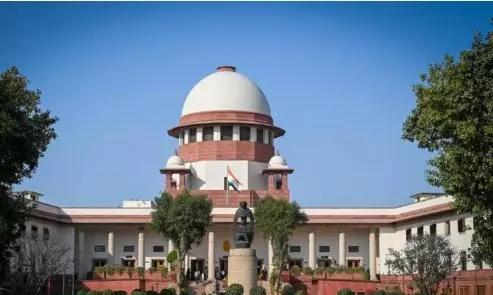
Religious bigotry weaponising secularism!
text_fieldsThe observations that the Supreme Court Bench chaired by Justice Sanjeev Khanna made, while considering the petition of BJP leader Subramanian Swamy and others seeking to remove the terms elucidating its fundamental nature, such as democracy, secularism and socialism from the preamble of the Constitution, is very relevant in today’s situation. The petitioners representing radical Hinduism argued that the words 'secularism' and 'socialism' were introduced in the preamble by the 42nd Constitutional amendment brought about by the then Prime Minister Indira Gandhi in 1976 during the Emergency and before that there was only democracy. However, the Supreme Court pointed out that secularism has always been a part of the basic structure of the Constitution. Calling secularism the main feature, the court said it is evident from the right to equality and fraternity enshrined in the Constitution. The court reminded that in many of its judgments it is clarified that secularism is a basic element of the Constitution.
Supreme Court Chief Justice D.Y Chandrachud's statement, hearing the appeal petition filed by Jamiat Ulema Hind against the Allahabad High Court's verdict repealing the Board of Madrasa Education Act, 2004 in Uttar Pradesh, rejects the narrow interpretation of secularism. The Chief Justice pointed out the fact that religious instructions given in religious institutions run by religious minorities does not constitute a violation of secularism. The High Court ordered the closure of madrassas in UP and the transfer of their students to schools, ruling that the 2004 Act violated secular principles. At the same time, the Supreme Court also reminded that the Hindu Religious Endowments and Charitable Institutions Act remains in force. States from Maharashtra to Tamil Nadu have these laws. It should be remembered that the Supreme Court set aside the High Court's ruling upholding the double standard of Hindutva governments that only religious institutions run by Muslim managements are not secular. It has been proven that the crookedness of the Sangh Parivar, aiming at the establishment of Hindu supremacy rejecting secularism in principle, reflected in the legislation and some court judgments for decades. The country realised the truth that the extreme rightwing faced the 18th Lok Sabha election with the evil aim of rewriting the secular socialist constitution itself if it gained two-thirds majority in the parliament. However, the masses that lined up behind INDIA bloc blocked their march towards this goal.
Hindutva forces are not sitting idly by, and they have not backed down from their dangerous cause. They are using all tactics to invade the judiciary and take away the constitutional rights of religious minorities. In 2010, when the Left Front government led by VS Achuthanandan was about to set up the `1000 crore 'Al Baraka' interest-free bank the Kerala High Court stayed it in the name of secularism over a petition against it. Subramaniaswami was the petitioner in the garb of a secularist! The essence of the Indian Constitution is that the state will not discriminate against any section on the basis of caste or religion and will treat all sections of citizens equally. The Supreme Court's intervention has stalled for the time being the planned move to subvert and uproot centuries-old religious schools by bypassing clauses guaranteeing religious freedom and educational protection to religious minorities. So much for the relief, the situation calls for constant vigilance of the secular parties and fronts. The patriots should realize the irony of using the democratic secular Constitution to permanently remove twenty crore people from their faith and culture instead of reforming and modernizing the madrasa movement that provided primary education even to the first President of India, Rajendra Prasad.























